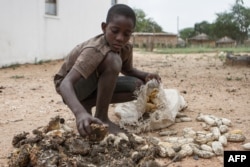The U.N. children’s fund warned Tuesday that Zimbabwe is facing a food and malnutrition crisis brought on by an El Nino-induced drought.
UNICEF said nearly 33,000 children in the country are suffering from severe acute malnutrition and are in urgent need of therapeutic treatment.
Zimbabwe has suffered through two consecutive seasons of failed rains, with disastrous consequences for harvests and family food reserves. UNICEF said food shortages have sent hunger and malnutrition levels spiraling upward. It said livestock has been dying because water sources have dried up.
A recent assessment found the share of hungry families in the country had more than doubled to 37 percent in the past eight months; nearly 2.8 million people in rural Zimbabwe will need food assistance, half of them children.
UNICEF spokesman Christof Boulierac said 2.1 percent of children under age 5 have severe acute malnutrition. The international threshold of 2 percent triggers an emergency response.
“As ever in a crisis of this nature, children face increasing risk of child labor, early marriage and violence," Boulierac said. "There are reports of increased physical and sexual violence, teen pregnancy and child marriage, which are often a kind of coping mechanism in situations of crisis.”
UNICEF reported that more than one-third of Zimbabwe’s households lack a safe water supply. It said this poses a peril for children, especially girls, who must walk very long distances in search of water, putting them at risk of sexual attack.
The children's fund said the lack of safe water also increases the risk of waterborne diseases, including diarrhea, typhoid and cholera.
The agency is appealing for $21 million to provide lifesaving and other essential services for children in the coming year, in the areas of nutrition, health, water and sanitation, education and protection. Without this money, it warned, things will get much worse for children in Zimbabwe in the coming months.














